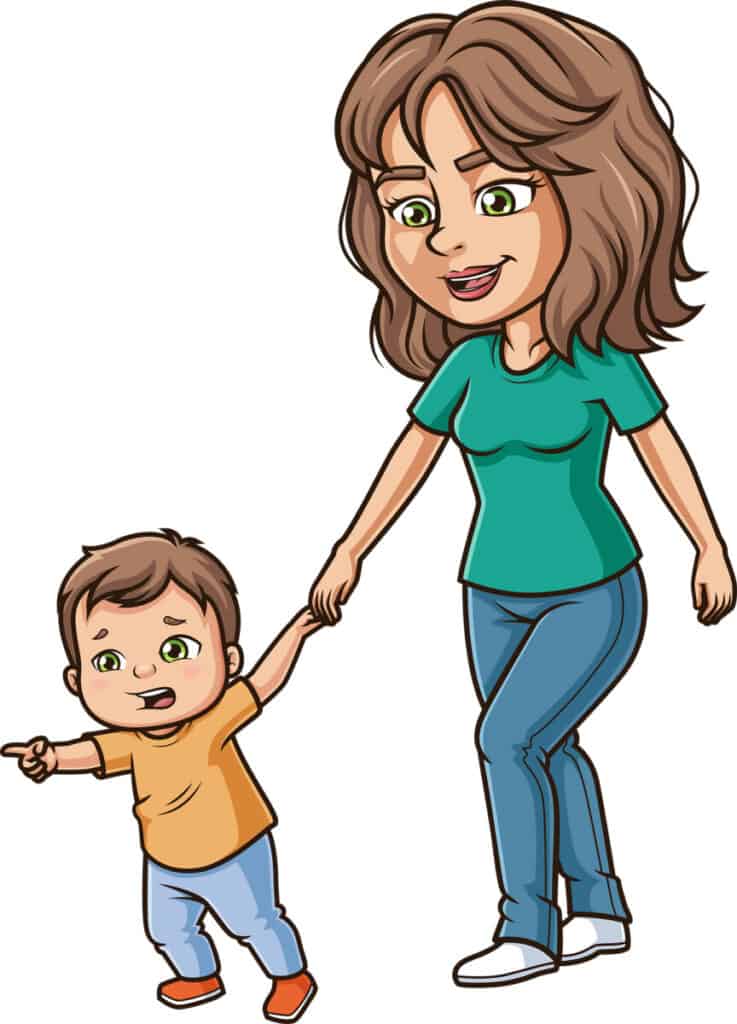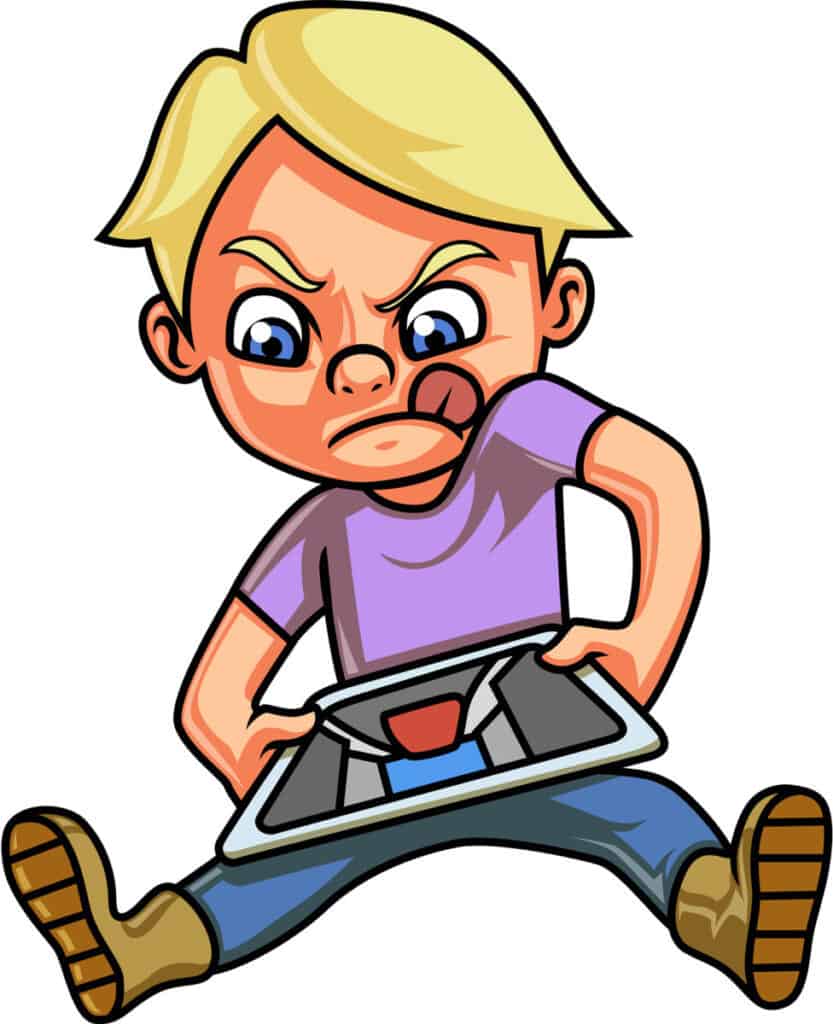
When it comes to parenting, it’s not always one size fits all. Every family is different, and different personalities react in different ways to certain techniques. However, some parenting techniques can potentially do more harm than good, leading to children ruling the roost. And one of these techniques is permissive parenting.
Permissive parenting is not a good idea because it can allow lasting harmful behaviors. It allows children too much freedom. This freedom often leads to harmful behaviors which includes poor time management and decision making, lack of achievement, aggression, bad habits, and even substance abuse.
This form of parenting should not be mistaken for a loving balance between justice and mercy when dealing with kids pushing boundaries. This form of parenting usually cuts out justice and predominantly centers on mercy and even simply placation.
Contents
Is Permissive Parenting a Good Idea?
The most common outcomes of permissive parenting tend to be negative. Child psychologists and researchers who have studied the long term effects of this technique mostly come to the same conclusions.
Children raised by more permissive parents tend to struggle more with social skills, self-discipline, and insecurities and become quite self-absorbed and demanding with others.
In a study done by researchers from East Tennessee State University and published in the Journal of American College Health found that college students of permissive parents had harder times in a college environment. They were more academically entitled meaning they expected high grades even when not producing high quality or even completed work.
They were substantially more susceptible to depression and mental health complications due to unrealistic expectations and the notions that they were owed more achievement than their efforts afforded.
What is Permissive Parenting?
A permissive person is someone who doesn’t like to say no to others. Instead, they allow excessive freedom of behavior.
In terms of parenting, permissive parents have a difficult time saying no to their kids. Mostly due to them not wanting to see their offspring upset. You may have witnessed this first-hand at your local supermarket. We often observe a frustrated parent giving in to their screaming child and buying them whatever they demand.
Permissive parents tend to be very loving but lack the ability to put rules and guidelines in place for their children. They tend to want to be seen as a friend, rather than an authority figure.
Here are the most common characteristics of permissive parents:
- Nurturing and loving
- Lack of rules and guidelines regarding behavior
- Rules may be inconsistent
- Acting more like a friend than a parent
- Using bribery techniques in exchange for good behavior
- Little or no structure or schedule
- Allowing their children a lot of freedom
- Very rarely disciplining
Time Management
Due to the lack of structure in their day-to-day life, children raised by permissive parents tend to have poor time management.
This can lead to poor management of routine in the future, which can interfere with both work and social life. It could result in the individual struggling to be on time for important events in the future, which can greatly affect their life goals and ambitions.
Poor time management can make a person seem unreliable to others, putting a strain on friendships, relationships, and colleagues.
Bad Habits
Another thing that can occur when children are raised permissively is developing bad habits and chaotic routines.
Lack of daily schedule from an early age can allow children to form bad habits. Such as, watching too much television, playing video games too frequently, and eating more than recommended for the average person.
Children raised by permissive parents quite often don’t know how to limit certain things in their life that could cause harm when done obsessively. Excessive video games, television, and overeating can lead to obesity, causing hazardous health complications further down the line if not corrected.
Teaching your child limits and adding a routine into their day can help them understand how much screentime is sufficient and help them understand portion control and times of the day to eat.
Emotions

When you don’t add some discipline into a child’s life and let them get away with things they shouldn’t, they can struggle to process their emotions later on in life.
The lack of boundaries set up for them early on can leave them feeling insecure in the future. They may also develop a habit of feeling self-absorbed, which can make them particularly demanding to others.
Permissive parenting is almost like raising your child in a bubble in an attempt not to upset them. However, doing so can result in self-entitlement, where they feel as if they are entitled to whatever they want as they are not used to being told ‘no.’
This can also hinder them emotionally in stressful or difficult situations.
Decision Making
Permissive parenting can also lead to extremely indecisive children with a lack of decision-making ability.
Not enforcing guidelines or rules within a child’s daily routine can hinder them in making choices and solving problems. This can be a huge problem in the future as throughout life we are faced with many problems, both big and small, that we will inevitably have to solve.
Although permissive parents mean well, they are essentially setting their children up to make a string of poor life decisions, leading them into further trouble. It’s extremely important to set up boundaries in a child’s life to teach them how to solve problems efficiently on their own to develop some independence.
Achievement

Due to children of permissive parents being allowed so much freedom, these children are often not given a platform to achieve goals.
Parents who use this technique strive for their children to be happy, which results in little to no expectations being laid out for the child to meet. This can be particularly harmful in later life as the individual is used to having no targets to aim for, so they tend to keep their goals and ambitions to a minimum.
This can lead to low achievements academically, which can add strain to their future when looking for jobs to support their lifestyle and keep them afloat. Research into permissive parenting has shown a common link between children raised with these techniques and lower academic achievements.
It’s important to give children goals to strive for in early life, no matter how small these goals may be. This gives them a stronger foundation to have ambition later in life and to keep pushing to reach these goals.
Source: NCBI
Aggression

One of the most common traits found in children of permissive parents is aggression later on in life.
When raised using these techniques, the child does not learn a good foundation of wrong and right. They are very much used to having things their way and getting everything they desire.
This can carry on into the future and become harder to deal with as they get older. Individuals parented permissively can become quite hostile and aggressive when they can’t have what they want. Which can result in them becoming argumentative and confrontational.
This can set them back when it comes to relationships, whether at work, a friend, or a lover. The individuals can become very demanding and may always think they are in the right during an argument. They can lack the empathy to see the other side of the debate and have difficulty with apologies when they find they are wrong about an issue.
Another article for further reading on how martial arts can help with child behavior is here.
Substance Abuse
Substance abuse isn’t an issue to take lightly, and studies have suggested that children raised more permissively are more likely to have issues with alcohol, illegal substances – or both.
As permissive parents don’t usually take an active role in shaping their child’s behavior, the individual may not learn to see heavy drinking and drugs as dangerous. Of course, this isn’t always the case; however, it’s something to consider when deciding whether it would be beneficial to discipline your child.
This can be down to children raised permissively not being able to handle peer pressure as lightly as children raised using more hands-on techniques. The individuals can often struggle to say no to others and can have trouble seeing right from wrong.
One study suggested that teenagers raised by permissive parents were three times more likely to binge drink regularly. Resulting in other risky behaviors such as recreational drugs and frequent misdemeanors.
Source: Alta Mira
Delinquency
Children of permissive parents have been linked to getting into trouble with the law.
Although this sounds scary, not all children raised permissively will end up in such bad situations. Studies solely suggest that there is a slight link between the two.
It’s the snowball effect of not knowing the difference between right and wrong, struggling to deal with peer pressure, binge drink, and drugs. Which could essentially link to delinquency and some run-ins with the cops.
This also links to children of permissive parents having poor decision-making skills, potentially leading them down the wrong path in the future. Being too strict can also result in similar issues, so it’s essential to have a good balance of rules and nurture when raising a child.
So is permissive parenting bad? Spoiler Alert…(yes)
Permissive Decisions That May Affect Your Child
Although you may want to make your child happy and not act as a burden on their life, there are some things that can greatly affect your child’s behavioral development. Here are some examples of parenting decisions that may lead your child down a dangerous or unproductive path in the future:
Unfiltered Use of Websites

There is a lot of child-friendly content online for children to view and enjoy; however, there is also a lot of harmful content meant for adults’ eyes only.
Some parents don’t like to hover over their children when they are using the internet. They would rather avoid confrontation and keep their children happy. However, suppose a child uses the internet unsupervised. In that case, they can very easily come across something they are not meant to see.
Websites such as YouTube are amazing for child-friendly content to keep kids entertained. However, one wrong click and your child could be watching something crossing the lines of violent, pornographic, and generally harmful.
There are even channels that have been specifically targeted to look like child-friendly content. These videos quickly change to hidden violent and predatory messages once the parent’s backs are turned. Children’s brains are like sponges. It’s best to keep their eyes away from unwholesome content, which could be detrimental to their mental development.
Unsupervised Video Games
It may be the easy way out to give in and let your child play certain video games because ‘everyone else is playing them.’ However, some video games are simply not created for children to play.
Games such as Grand Theft Auto may sound like a fun racing game; however, it is full of violence, vulgar language, and pornographic images. Allowing your child to play games such as this unsupervised may result in them learning these behaviors as ‘normal’ and applying them to their life in the future.
Whether this be using bad language in the playground and ending up in detention or developing a habit of finding pornographic content at a young age, playing adult-themed games unsupervised is best avoided until the child is of age to play alone.
Not setting limits and boundaries on your child’s video game screentime can result in addictive tendencies and aggression when they no longer get what they want. In the future, this can lead to bad habits and behaviors in everyday life.
Dating and Adult Situations
Letting kids find themselves in unsupervised adult situations such as dating can be harmful to their development.
Most children will go through phases of childhood crushes. Some may even begin to have an innocent relationship. However, when left unsupervised, this could become an issue. Children, especially those raised permissively, can succumb to peer pressure very quickly, which could lead them into adult activities that they’re not mentally prepared for.
Allowing your child to insert themselves into adult situations so early on in life can lead them to make mistakes that they may regret long into the future. It’s important to supervise your child when they are around other children, and adults to ensure that they’re not pushed into anything that could be harmful.
A child’s brain is not developed enough to understand the repercussions of certain situations, so something that they believe to be normal now may be something they deeply regret further down the line. Experiences like this could potentially alter their mental state and behavior in the future and hinder them in life. You may also want to read this other article we wrote that addresses this subject in detail.
Unsupervised Interactions with Other Children
Although it’s not necessary to watch every move your child makes, it’s best not to allow them to wander too far out of reach with other children.
Allowing your child to play outside with other children unsupervised could lead them into more dangerous, peer-pressured behaviors. Whether this is wandering off too far from home, playing in rough areas with the wrong type of people, watching adult content, or playing adult video games without your knowledge.
These types of situations they end up in could lead them to make more poor choices in the future, which could potentially put them in danger or even in trouble with the law. A few small white lies and harmful actions now may not seem like a big deal. However, if continued with no repercussions they can easily snowball into bigger and more hazardous issues.
Something as small as hanging around with the wrong people unsupervised could run the risk of drinking, drugs, and petty crimes in the future. Of course, no two children are the same, and not every child will fall into these habits. However, it’s better to have the foundations in place to avoid the potential risks of these behaviors occurring.
This issue is so important that we’ve addressed it in another article here.
Final Thoughts
It’s amazing to want to be friends with your child instead of an authority figure; however, it’s better for your child’s development to be both. The nurturing and loving side of a permissive parent is something others can learn from; however, it’s important to add rules and guidelines as essential parts of learning.
By not putting these guidelines in place, you can run the risk of your child developing bad behaviors and habits such as being self-entitled, demanding, and indecisive. They can struggle with social cues, saying no to peer-pressure, and can fall into bad habits such as overeating, obsessive screen watching, and binge drinking.
If you’d like to read more about parenting styles, check out this other article where we address authoritative parenting.
